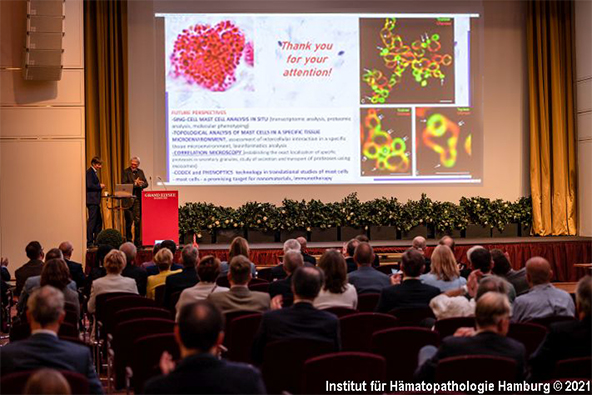Oncogenesis and mast cells - RUDN scientist Dmitry Atyakshin spoke at an international symposium in Germany

Dmitry Atyakshin made a presentation on "Mast cells in the formation of the immune landscape and regulation of the extracellular matrix of a specific tissue microenvironment (fundamental, diagnostic and pharmacological aspects)". The scientist studied mast cells — cells with a unique regulatory potential of the tumor microenvironment.
Mast cells are key elements in the formation of the tumor microenvironment. They take part in the transformation of the immune landscape, regulation of the state of the integrative buffer metabolic environment, remodeling of the extracellular matrix and the implementation of other pathogenetically significant molecular mechanisms of oncogenesis.
Mast cells can induce tumor progression or initiate its regression, therefore their organ-specific molecular phenotype affecting receptor, secretory and degranulation parameters can not only be used for diagnostic purposes, but also represent promising targets of targeted therapy.
Now mast cells are considered as one of the main cellular representatives of the tumor microenvironment. Many researchers associate the key regulatory effects of mast cells on immunogenesis and tumor stroma with the resulting outcome of the disease and the patient's fate.
At the same time, most of the results obtained are very contradictory and do not allow us to formulate a unified interpretation of the importance of mast cells in angiogenesis, connective tissue remodeling, cell proliferation, changes in the nature of intercellular signaling, further progression and metastasis of the tumor or its regression.
In his research, Dmitry Atyakshin for the first time used the methodological and bionanotechnological capabilities of chromogenic and fluorescent multiplex immunohistochemistry to study a number of selective mechanisms of mast cell involvement in oncogenesis mediated by preformed secretome components. The scientific project is devoted to the analysis of pro- and anti-tumorogenic effects of tumor-associated mast cells.
The scientist investigated the mechanisms of participation of mast cells in the formation of the immune landscape of the tumor and the regulation of the extracellular matrix of a specific tissue microenvironment in melanoma of various localization. The research focuses on the molecular parameters of tumor-associated mast cells in terms of quantitative and qualitative population characteristics, biogenesis and post-translational modification of specific proteases - tryptase, chemase and carboxypeptidase A3.
Dmitry Atyakshin stressed that mast cells as an object of translational studies of oncogenesis are not only promising diagnostic solutions, but also effective targets for cancer immunotherapy. Receptor, secretome and degranulation phenotypes of mast cells are closely related to the molecular portrait of the tumor and can be projected to predict the outcome of the disease or evaluate the effectiveness of therapy.
The interaction of mast cells with immune, stromal and tumor cells determines the unique properties of the tumor microenvironment. Further studies of the molecular phenotype of mast cells open up new pages of effective targets for targeted modulation of oncogenesis to regulate the mechanisms of progression and invasive properties of the tumor.
"Fundamental studies of the tumor microenvironment are extremely in demand, since the degree of progression of oncogenesis and pathomorphosis of the tumor depends on its condition. The scientific problems that are solved by multiplex immunohistochemistry methods in the study of mast cells are important elements for the progress of personalized medicine, including the discovery of new hypotheses of oncogenesis, original diagnostic markers, and, ultimately, effective therapy strategies," Markus Timann, Director of the Institute of Hematopathology Hamburg (Germany).
According to the results of the study, the RUDN scientist will publish research in highly rated journals of the first quartile:
Carboxypeptidase A3 is a key component of the protease phenotype of mast cells.
Tryptase, chymase and carboxypeptidase A3 as informative markers of the secretomic landscape of an organ-specific mast cell population.
Cytological and histotopographic features of specific proteases of tumor-associated mast cells in skin melanoma.
About the event
The International Symposium "Actual problems of pathology in personalized oncology" was held in order to exchange experience in introducing the results of fundamental research into the practical course of medicine - diagnostics and targeted therapy of oncological diseases. The issues of digital medicine, hematological aspects of pediatrics, possibilities of modern diagnostics of oncological diseases and hematopathology, evaluation of treatment results, new strategies of targeted therapy, etc. were considered.
More than 150 well-known specialists from leading medical and scientific organizations in Germany and other countries of the world presented the results of their own research on molecular pathology and personalized oncology - priority areas of activity of the scientific and educational biomedical cluster "Translational Medicine" of the RUDN.
On February 6-7, RUDN University hosted an international scientific and practical conference “Modern university mission in the context of transformation challenges in a multipolar world”. The event was timed to coincide with the 65th anniversary of the founding of RUDN University.
About 200 participants from Russia and 20 countries met at the National Interdisciplinary Scientific Seminar with International Participation “Law in Medicine. Medicine in Law: Points of Contact”. The subject was “Happy Motherhood: unsolved problems of obstetrics, gynaecology and perinatology”.
The collection consists of two volumes and includes biographical information about Russian demographers and their scientific research. The first volume is devoted to the research of the Pre-Revolutionary period, the second to the works of the Soviet era and the present.
On February 6-7, RUDN University hosted an international scientific and practical conference “Modern university mission in the context of transformation challenges in a multipolar world”. The event was timed to coincide with the 65th anniversary of the founding of RUDN University.
About 200 participants from Russia and 20 countries met at the National Interdisciplinary Scientific Seminar with International Participation “Law in Medicine. Medicine in Law: Points of Contact”. The subject was “Happy Motherhood: unsolved problems of obstetrics, gynaecology and perinatology”.
The collection consists of two volumes and includes biographical information about Russian demographers and their scientific research. The first volume is devoted to the research of the Pre-Revolutionary period, the second to the works of the Soviet era and the present.